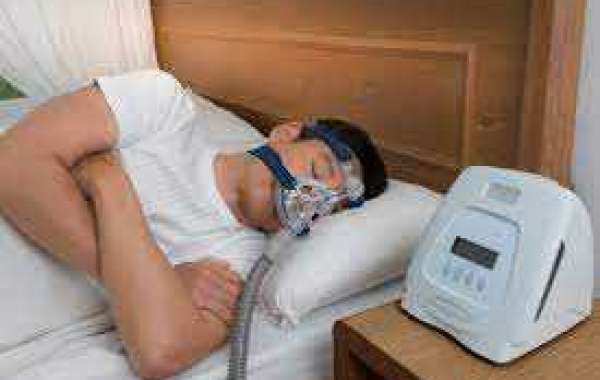
Can OSA Cause Early Alzheimer's Disease?
Our physical and mental health are both critically influenced by sleep. Quality sleep is specifically necessary for cognitive function and long-term memory. Maybe that's why it's not surprising that some studies have found a connection between sleep disorders like obstructive sleep apnea and Alzheimer's. Recent research has revealed that treating obstructive sleep apnea (OSA) can aid older people with dementia-related cognitive decline. While sleep loss is one of the symptoms of dementia in certain people, worsening dementia symptoms due to sleep deprivation may create a vicious cycle that quickens the decline of general cognitive function.
What is Sleep Apnea?
An airway obstruction while sleeping is a typical symptom of obstructive sleep apnea (OSA). People with this obstruction frequently stop breathing during the night and often wake up gasping or choking. Numerous health hazards, including stroke, type II diabetes, and cardiovascular disease, have already been connected to OSA. When you have OSA, or obstructive sleep apnea, your breathing stops and repeatedly starts while you're asleep. Breathing disturbances are brought on by throat muscles that oversleep and restrict the airway. Regularly interrupting your regular sleep cycle might impact your physical and mental well-being. Snoring, excessive daytime sleepiness, headaches, forgetfulness, lack of concentration, and mood swings are just a few signs of sleep apnea.
The Impact of Sleep Apnea on Memory
Due to the frequent disruption of sound sleep caused by sleep apnea episodes, many patients feel sleepy throughout the day because they do not get enough sleep at night. Continuous sleep deprivation starts to affect the health of the brain. The first to suffer are mental processes like memory and focus. The critical part sleep plays in maintaining the health of our brains is becoming understood. There is mounting data that suggests insomnia may raise the risk of dementia.
What is Alzheimer's?
Brain cells die in Alzheimer's, a degenerative condition that causes disorientation and memory loss. Older people are more likely to have the disease. There are over 50 million people who have this illness worldwide. Common symptoms may include difficulties with numbers, mood swings, reduced motor function, confusion, and memory loss.
The Relationship Between OSA and Alzheimer's
Regarding Alzheimer's disease, a meta-analysis of nine observational studies found that OSA may more than double the risk of cognitive decline or illness. A meta-analysis of five studies found that OSA is more common in those with Alzheimer's. Additionally, according to several studies, OSA may affect the molecular indicators for Alzheimer's disease levels in older adults who are otherwise cognitively healthy. Having an OSA diagnosis may eventually worsen these biomarkers. Some indications or risk factors for OSA are snoring, daytime sleepiness, obesity, being a man, and advanced age. Typically, a sleep clinic is used to diagnose sleep apnea. The most popular sleep apnea treatment form is a continuous positive airway pressure (CPAP) machine.
A CPAP machine has a mask that continually forces air into the mouth and nose, preventing breathing pauses throughout the night. Randomized controlled trials have produced conflicting results regarding whether CPAP treatment helps adults with OSA cognitive. Numerous research indicates that an auto CPAP device enhances various cognitive functions in healthy patients, including vigilance and attentiveness. Similarly, although the evidence is conflicting, several studies imply that initiating CPAP therapy and improving CPAP compliance in Alzheimer's patients with OSA may improve some aspects of cognition. The majority of the studies are tiny and have a short length, which makes it challenging to evaluate these randomized controlled trials.
How could OSA raise the chance of developing Alzheimer's disease?
The number of grave health issues connected to sleep apnea merely keeps growing. Researchers are discovering additional illnesses linked to OSA as they try to comprehend the origins, side effects, and best course of treatment for it. Studies now link sleep apnea and Alzheimer's disease. Obstructive sleep apnea has been linked to daytime sleepiness, headaches, and cognitive deficits such as memory loss, disorientation, delayed reaction time, and depression. Additionally, it has been linked to heart disease, diabetes, hypertension, stroke, and obesity. Recent research has also suggested that those with sleep apnea may more likely develop Alzheimer's.
Consolidating memories is one of the many brain functions that benefit from a restful night's sleep. Breathing interruptions can lower blood oxygen levels, which could harm brain cells. Additionally, OSA is linked to several other conditions that can raise your chance of developing Alzheimer's disease, including hypertension, cardiovascular illness, and depression. Sleep disruption brought on by OSA may impede these procedures. Consider visiting a sleep disorder specialist, typically located at specialized sleep facilities, if you snore, feel weary all day, or have other sleep-related concerns. They could advise you to get a sleep study done to determine whether you have OSA and to explore your treatment options.
The Importance of Quality Sleep for Health
Fortunately, we continue to learn more about the critical function of sleep in maintaining our health and the best approaches to treating sleep disorders. More people can sleep and live well because of the various therapy choices available today. You should get a diagnosis and request sleep testing if you are experiencing trouble getting sound slumber. It is an essential step in ensuring general wellness.